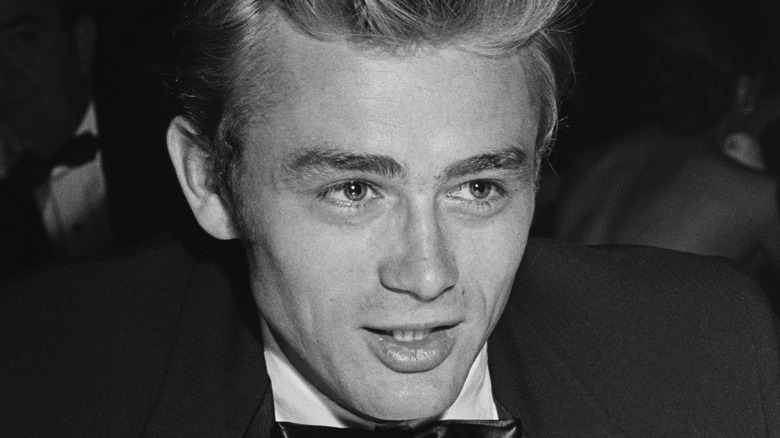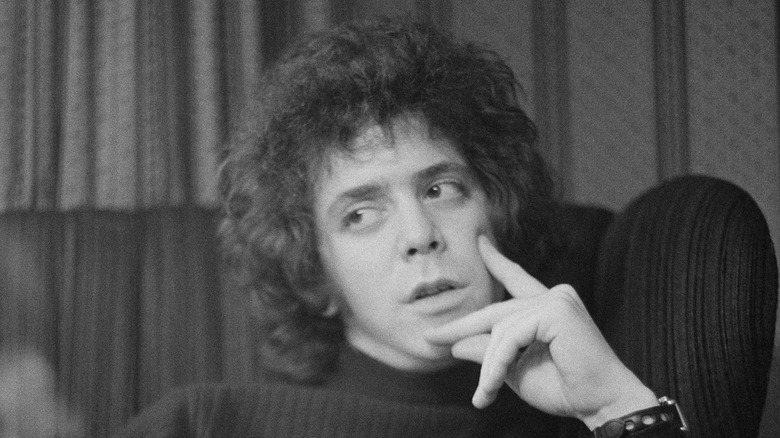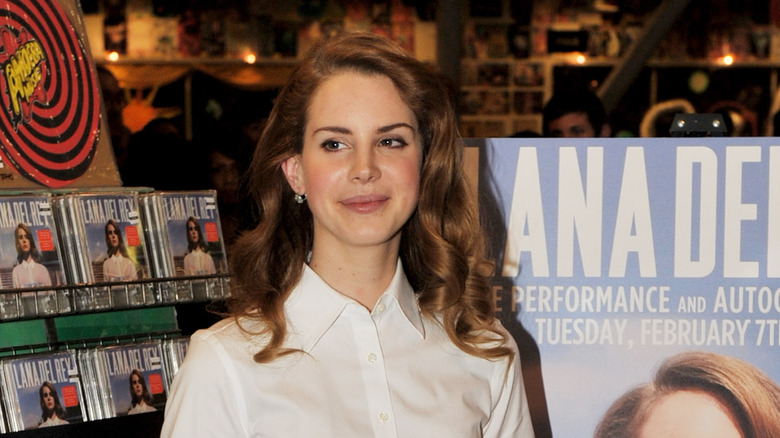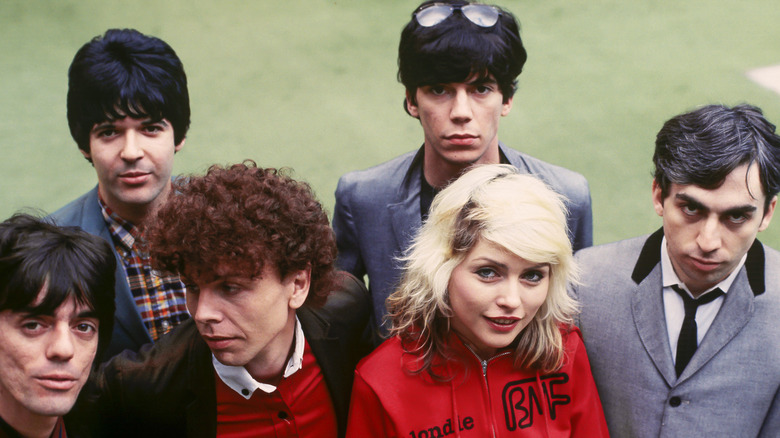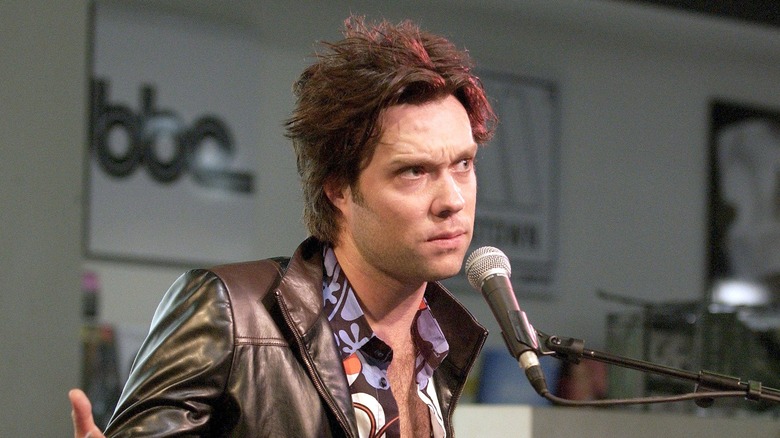Famous Songs Inspired By James Dean
James Dean's death might have been nearly seven decades ago, but he lives on in the art world. The iconic actor — or more specifically, the iconic persona he left in his wake — has inspired countless works of art, from visual art and movies to books and songs. His outsider persona helped inform the Beat Generation, as well as generations of bad-boy movie stars.
Due to all of the mythology and ideology associated with the actor, dropping a reference to James Dean into a song is an easy way to convey a specific mood, idea, or attitude. More specifically, the actor's name brings to mind an all-American, devil-may-care ideology, along with themes of freedom, rebellion, coolness, and mystery. It conjures images of fast muscle cars, outsiders and misfits, and Old Hollywood imagery, and it can evoke fun, adventure, and rule-breaking as much as grief, tragedy, and loss. Here are just five of the countless songs that reference Dean, directly or abstractly.
Walk on the Wild Side by Lou Reed
"Jackie is just speeding away/Thought he was James Dean for a day," Lou Reed sings in his 1972 hit "Walk on the Wild Side" (via Genius). "Then I guess she had to crash/Valium would have helped that bash."
"Walk on the Wild Side" is a counterculture anthem that first appeared on the former Velvet Underground frontman's iconic, David Bowie-produced album "Transformer." The song's lyrics are composed of several vignettes of outsiders who travel to New York City to start a new life and create a new identity, struggling along the way to make ends meet and survive the big city and their own impulses. Each character was based on a member of Andy Warhol's Factory, according to The New Yorker. "Jackie" referred to Jackie Curtis, a genderqueer artist who once told a Village Voice journalist (via Artforum), "I'm tired of being Jackie Curtis. ... I wanted to play James Dean, so I became him."
It seems fitting that Reed name-checked Dean, considering the actor is arguably one of the foremost icons of the counterculture movement. With his mysterious personality, all-American look, and daredevil attitude that challenged the popular thinking of the 1950s, Dean is forever a symbol of an American Dream being realized and then promptly destroyed.
Blue Jeans by Lana Del Rey
"Blue jeans, white shirt/Walked into the room you know you made my eyes burn," Lana Del Rey sings in her 2012 single "Blue Jeans" (via Genius). "It was like James Dean, for sure."
Like many icons, Dean is often pictured in a particular, trademark outfit: the all-American uniform of blue jeans and a white t-shirt. That outfit alone is central to "Blue Jeans," which is a dramatic ballad about a lost-but-lasting love that appears on Del Rey's first album, "Born to Die." The accompanying music video sees Del Rey poolside and in front of an American flag with a Dean-inspired "bad boy" type sporting the denim-and-cotton uniform and some serious tattoos. The music video ends with a fiery car accident, a nod to Dean's untimely death.
It's no surprise that Del Rey featured Dean front and center in one of the first singles of her career, as Americana themes and rebellious imagery have been woven through her entire discography, both lyrically and aesthetically, as noted by Entertainment Weekly.
Fade Away and Radiate by Blondie
Blondie's song "Fade Away and Radiate," from the band's 1978 album "Parallel Lines," takes a less obvious approach to referencing James Dean. "My dream is on the screen," sings frontwoman Debbie Harry (via Genius). "Dusty frames that still arrive/Die in 1955/Fade away and radiate." While the song does not name James Dean directly, its mention of a 1955 death is a clear reference to Dean's death in a car crash in Cholame, California, on September 30, 1955, as noted by History.
According to The Guardian, the song "fused some of the things Blondie loved most: sci-fi, Hollywood glamour and being awake at 4 a.m., watching old movies in a narcotized haze." The song views dead icon James Dean through an old television in the middle of the night, as the watcher falls asleep to footage from a bygone era. "Ooh baby, watchful lines vibrate soft in brainwave time," Harry sings. "Silver pictures move so slow/Golden tubes faintly glow/Electric faces seem to merge."
Peach Trees by Rufus Wainwright
"Is true love a trip to Chinatown/Or being held in one's opium gaze/Under the peach trees/There I'll sit and wait," Rufus Wainwright sings at the beginning of "Peach Trees," a track on his 2004 album "Want Two" (via Genius). The song finishes with the lyrics, "I'm going to see James Dean/There I will be ... Under the peach trees/With him."
The poetic ballad is a daydreamy love song about James Dean from Wainwright, who often explores queer themes in his lyrics. There have been countless reports about Dean's fluid sexuality — both while he was alive and in the decades since his death — by both fans and his former collaborators. On the topic of his sexuality, Dean reportedly once said, "Well, I'm certainly not going to go through life with one hand tied behind my back," as quoted in Randall Riese's "The Unabridged James Dean: His Life and Legacy from A to Z."
5 Years Time by Noah and the Whale
"Oh well, I look at you and say/It's the happiest that I've ever been/And I'll say I no longer feel I have to be James Dean" (via Genius). Such are the lyrics to Noah and the Whale's joyful 2008 single "Five Years Time," which appeared on the indie folk-rock band's album "Peaceful, the World Lays Me Down." The song imagines where the narrator and his companion might be in five years — at the zoo, soaking up the sun, laughing and smoking cigarettes, and drinking wine.
The Dean-centric verse in "Five Years Time" imagines a scenario in which the narrator can be himself rather than trying to be cool. Dean is often seen as a symbol of utter coolness, with an unparalleled air of mystery and magnetic detachment. But many of his former friends and co-stars have suggested the actor was misunderstood, describing him as shy, even socially awkward.
"He would be bothered when someone would say he was mean and disrespectful," Lew Bracker, Dean's friend and writer of the 2013 book "Jimmy & Me: A Personal Memoir Of A Great Friendship," recalled (via JamesDean.com). "Because actually, he wasn't. They took silence to mean he cared little or nothing for them. They didn't have the insight, or didn't care to exercise the insight, in knowing that he was a shy boy that just didn't know how to approach them. Instead of making an attempt to approach him, they just, well, they just wrote him off."
